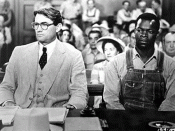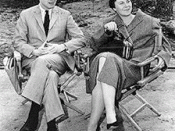In Harper Lee's To Kill A Mockingbird, the main character, Scout, is retelling stories of her childhood. Scout, her father Atticus, and her brother Jem live in a small Alabama town dominated by racism and prejudice. This provides for many situations in which the young Scout is confused or angry. However, the adult Scout had looked back on and analyzed these events, and now fully understands them. Like the mob scene at the jail, the Tom Robinson trial, and the mystery of Boo Radley. Throughout the book, the adult Scout is looking back on and commenting on the events that occurred during her childhood. The adult Scout's perspective is important throughout the novel because it provides us with a complete understanding of events from both a child's standpoint as well as a retrospective analysis from an adult's standpoint.
At one point in the novel, a crowd gathers in front of the jail because they want to lynch Tom Robinson. Atticus and the children go down to the jail to talk to Tom and the mob. While they are there, Scout pulls one man, Mr. Cunningham, aside and has a talk with him about his son Walter, asking him to say "hey" for her. This shows that Scout doesn't really understand the magnitude of the situation. Later on however, Scout begins to understand the importance of what had happened. She realizes that the mob probably would have hurt Atticus if she and Jem hadn't have been there. When Atticus, Jem, and Scout are discussing the mob, Atticus tells the children that they'll "understand folks a little better when [they're] older." (Lee 157). This is like the difference between child and adult Scout's perspectives. As a young child, Scout doesn't understand certain things that people do, like how Mr. Cunningham would...


